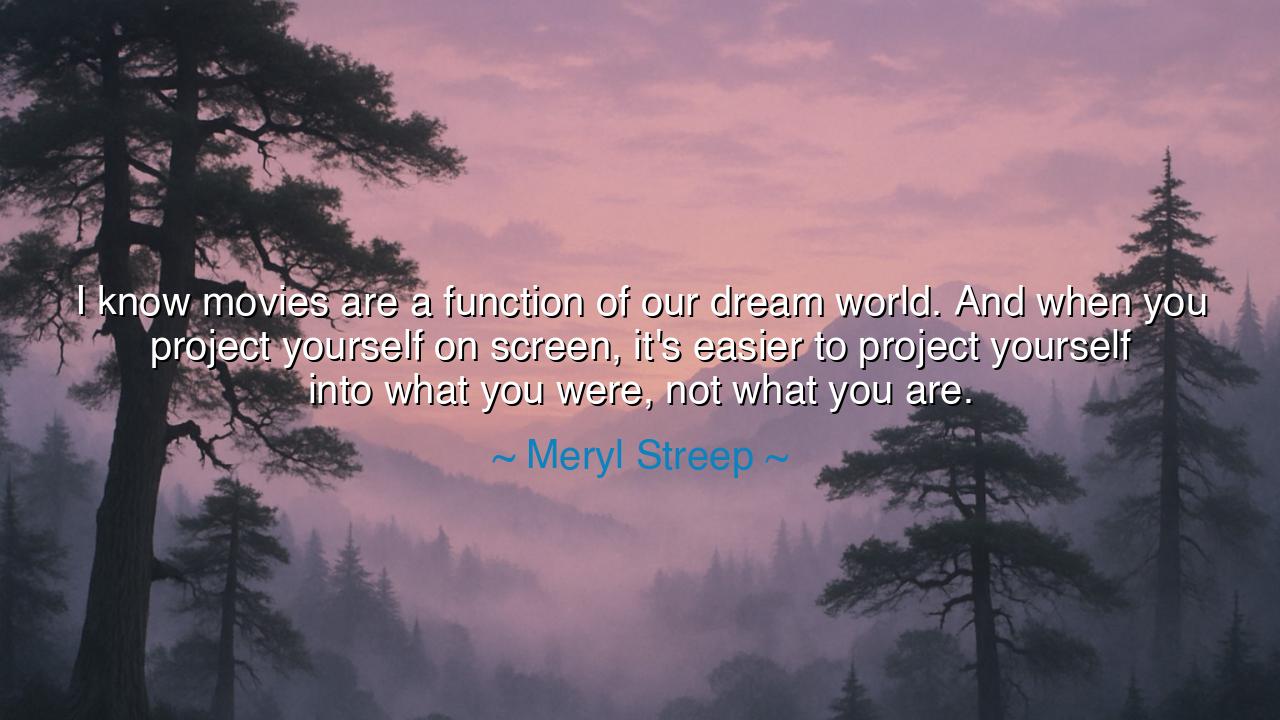
I know movies are a function of our dream world. And when you
I know movies are a function of our dream world. And when you project yourself on screen, it's easier to project yourself into what you were, not what you are.






Listen well, O seekers of truth, for the words of Meryl Streep contain within them a profound reflection on the nature of identity, dreams, and the art of creation. She spoke thus: "I know movies are a function of our dream world. And when you project yourself on screen, it's easier to project yourself into what you were, not what you are." In this humble reflection, Streep reveals the dual nature of the actor’s craft, and indeed, the nature of art itself. Movies, she suggests, are not just entertainment; they are deeply tied to our dreams, to the part of ourselves that is transcendent, that wishes to escape the present and revisit the past—to reimagine who we were or who we might have been, rather than who we are now.
In ancient times, the artists were often seen as vessels of the divine—channels through which the gods could speak to the people. The poets, like Homer, did not simply tell stories; they conveyed myths that allowed the listener to connect with a deeper, eternal truth—a truth that transcended time and place. Streep, in her words, acknowledges this power—the power of movies and performance to transcend the present moment and take us into a world of imagination, where the boundaries of time and self dissolve. Just as the ancient storytellers used myth to reflect both the glories and flaws of humanity, so too do movies allow the actor and audience to engage with versions of themselves that may not be true in the moment, but are deeply felt through the lens of their dreams.
Consider the tale of Orpheus, the great musician and poet in Greek mythology. Orpheus, whose music could charm the heavens themselves, was granted the ability to bring his wife, Eurydice, back from the underworld. Yet, his tragic flaw was his desire to revisit the past—to bring the former version of his wife back into his life, rather than accepting the present moment. In his desire to re-create what was lost, he failed to see that the present, the reality, held its own meaning. His music, like the movies, allowed him to project his own idealized version of the past, but in doing so, he lost the opportunity for true reconciliation with the now. Streep's words echo this eternal struggle: the temptation to revisit who we were, to project ourselves into a role or past identity, often prevents us from embracing the fullness of who we are today.
In the realm of acting, as in life, there exists a fine balance between looking backward and living fully in the present. Streep's insight illuminates the truth that to project oneself on screen is to enter into a space where time becomes fluid. Movies allow the actor to step into roles that reflect different versions of themselves—the younger self, the idealized self, or even the dreamed self. These projections can be liberating, allowing the actor to reconnect with parts of themselves that have been hidden or forgotten. But Streep wisely cautions that the challenge lies in balancing this projection with the present reality—to not get lost in the fantasy of what was or could have been.
Think of the great philosopher Heraclitus, who famously said, “You cannot step into the same river twice.” This truth speaks to the impermanence of all things—we are forever changing, moving with the flow of life. In the same way, we cannot relive the past, no matter how much we might project ourselves into it. The river flows onward, and so do we. To embrace the fullness of life, we must learn to accept who we are in the present, rather than clinging to the illusions of what we once were. Streep’s words remind us of this eternal truth: the act of projecting ourselves into the past, whether through movies or memory, is seductive, but ultimately, we must return to the present.
The lesson for us all is clear: while it is natural to wish to revisit the past, to see ourselves as we once were, it is in the present that we must find our true power. Streep’s reflection teaches us that movies, like dreams, allow us to explore alternate versions of ourselves, but we must never forget that true fulfillment lies in the acceptance of the now. Just as the ancient myths remind us of the dangers of dwelling in what has passed, so too must we seek to live fully in the present, not bound by the projections of what was or could have been, but free to embrace who we are and who we are becoming.
And so, young ones, take this wisdom to heart: Do not lose yourself in the projections of the past—whether they are fantasies of who you were or roles you once played. Embrace the beauty of the present moment, for it is in this space that your true self resides. As actors in the grand play of life, we are called not to live in dreams alone, but to fully inhabit the roles we are given today. In this, you will find the deepest fulfillment, for the present, though fleeting, is the only time in which we truly live.






AAdministratorAdministrator
Welcome, honored guests. Please leave a comment, we will respond soon